2013版初中英语全程复习方略课件(教材复习案)七年级上册 Modules 6-10(外研版) (共56张PPT)
文档属性
| 名称 | 2013版初中英语全程复习方略课件(教材复习案)七年级上册 Modules 6-10(外研版) (共56张PPT) |
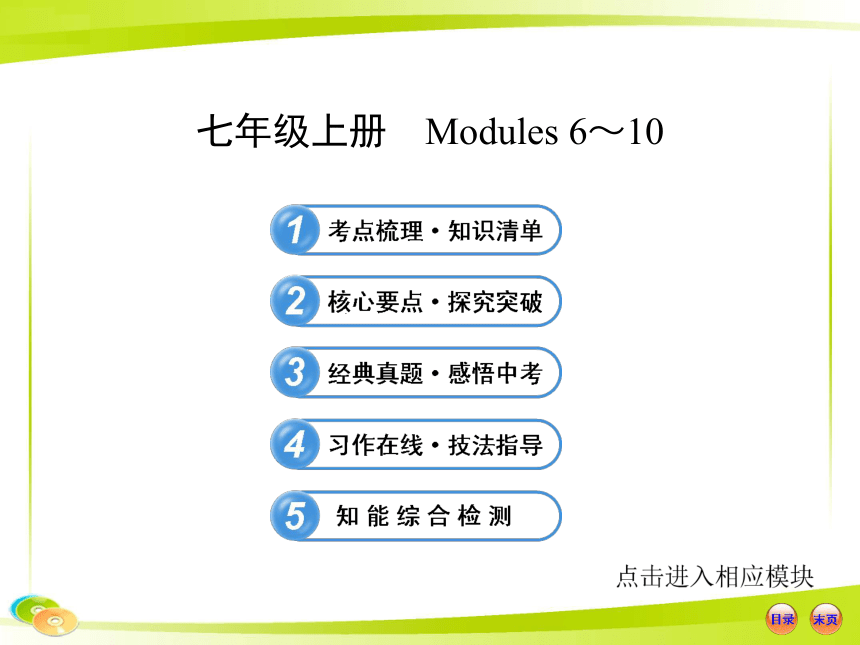
|
|
| 格式 | zip | ||
| 文件大小 | 1.6MB | ||
| 资源类型 | 教案 | ||
| 版本资源 | 外研版 | ||
| 科目 | 英语 | ||
| 更新时间 | 2014-03-01 00:00:00 | ||
图片预览

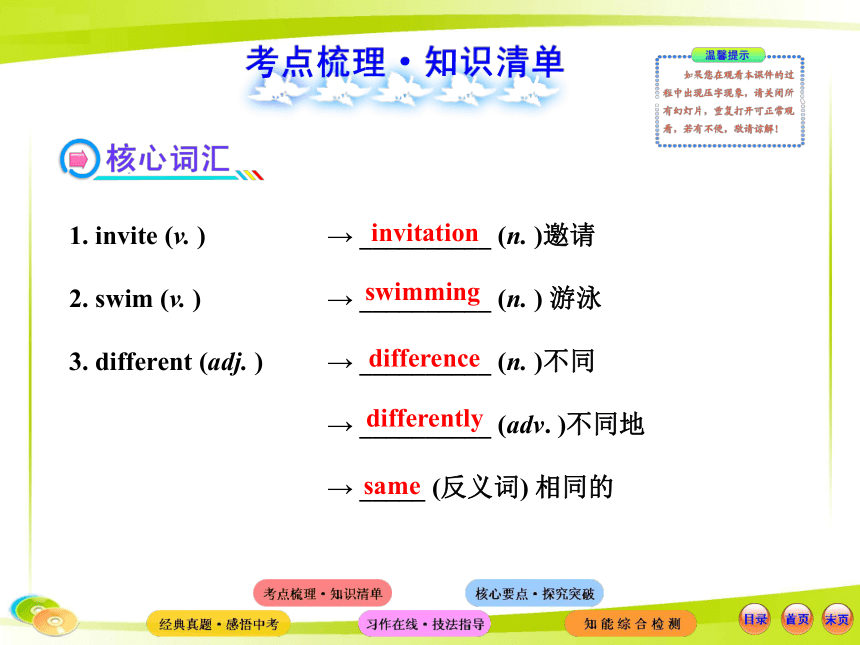
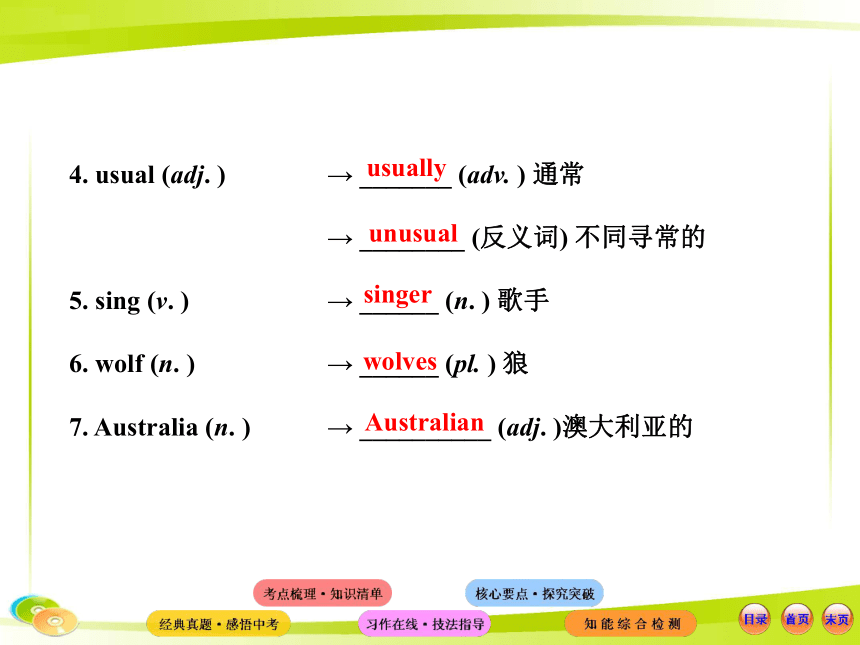
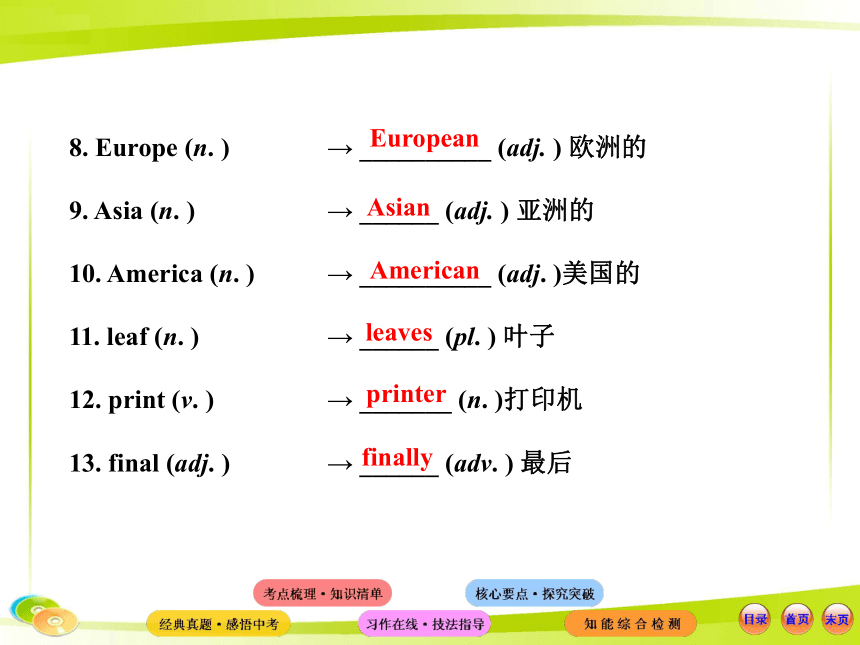
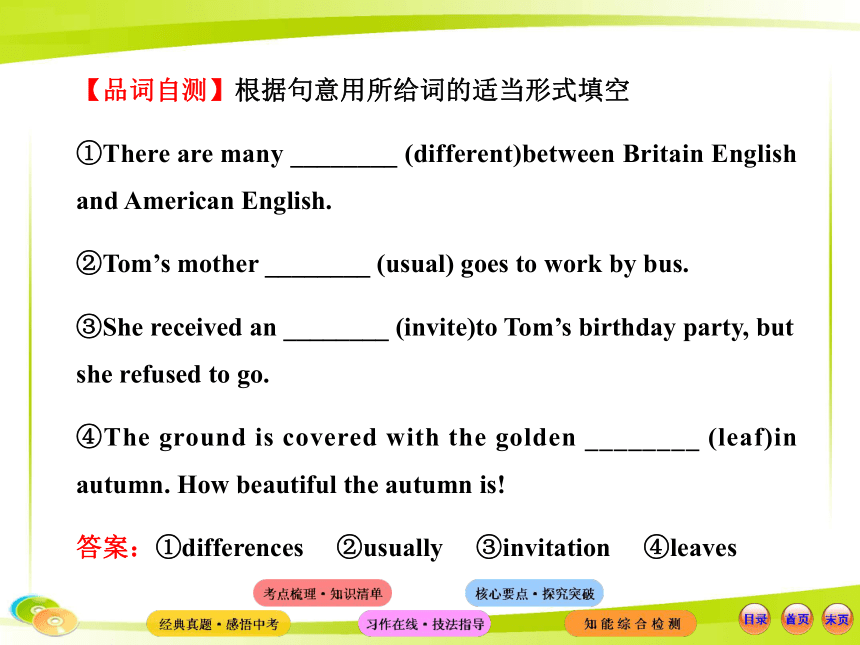
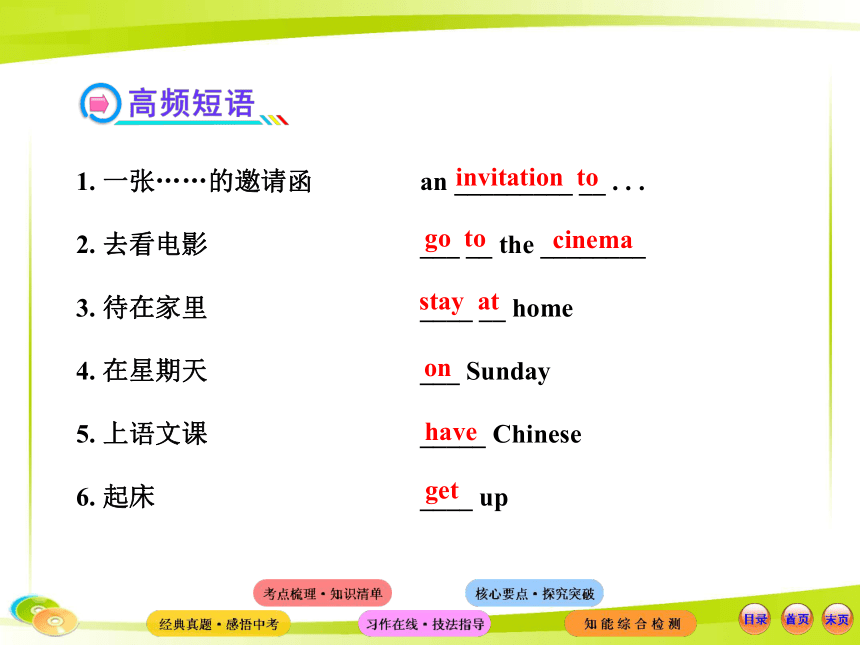
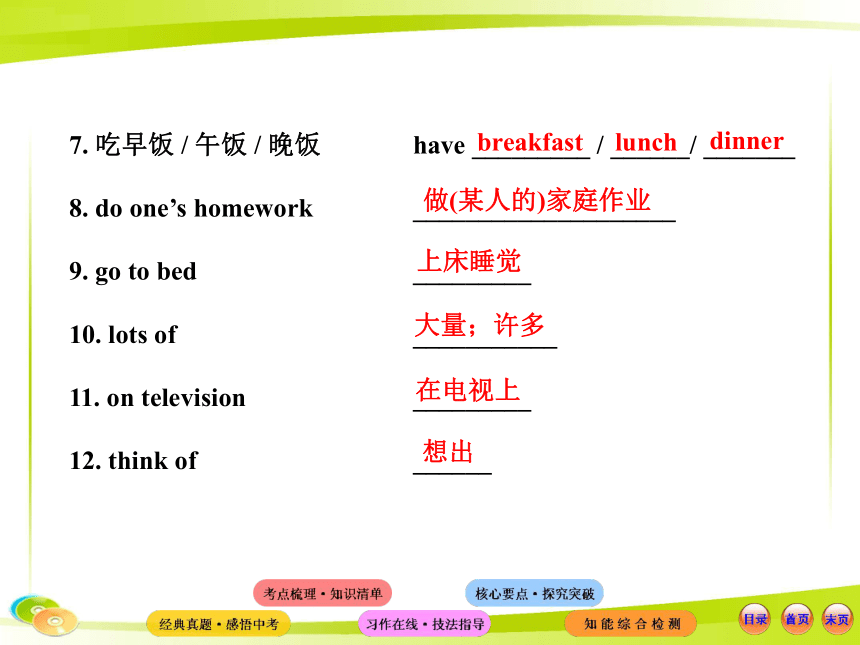

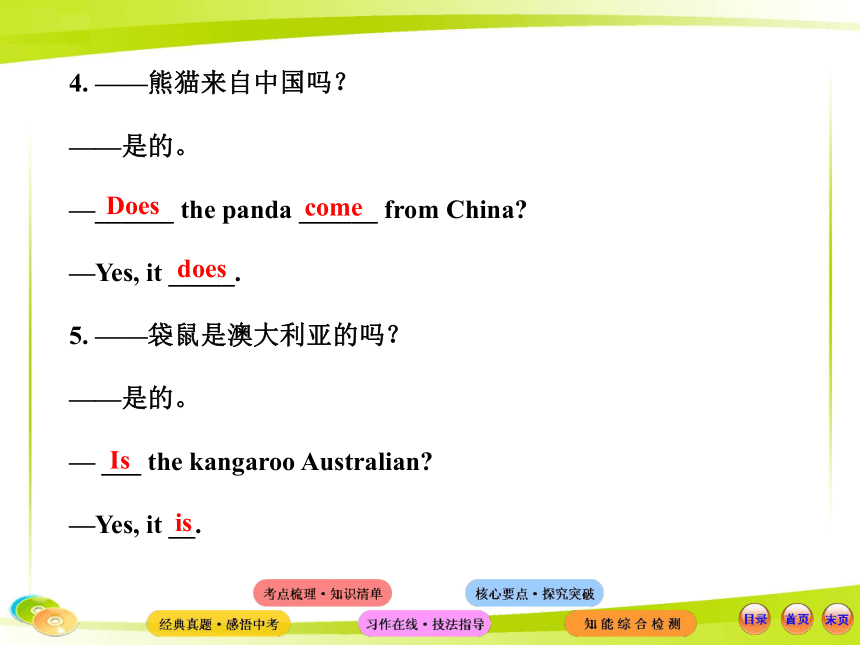
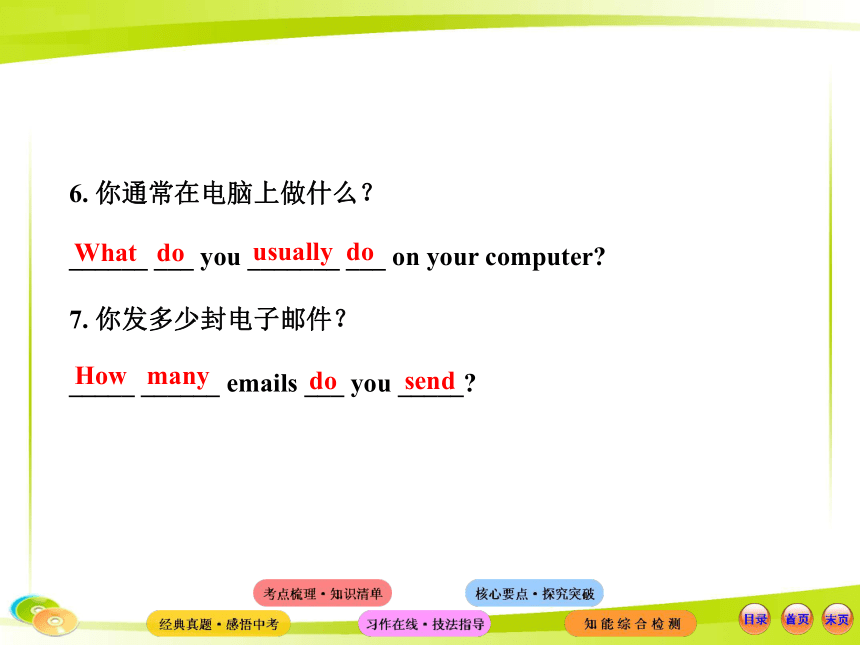
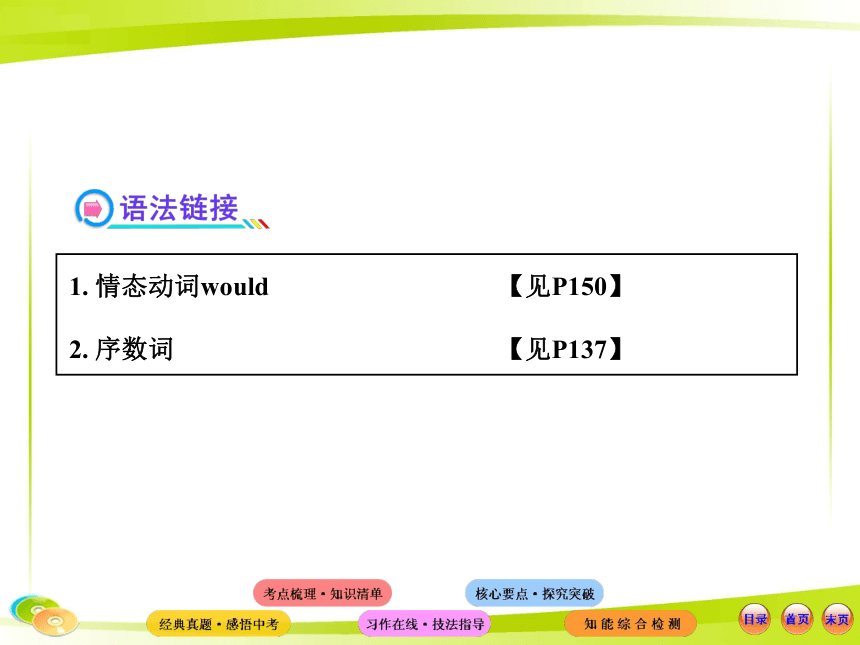
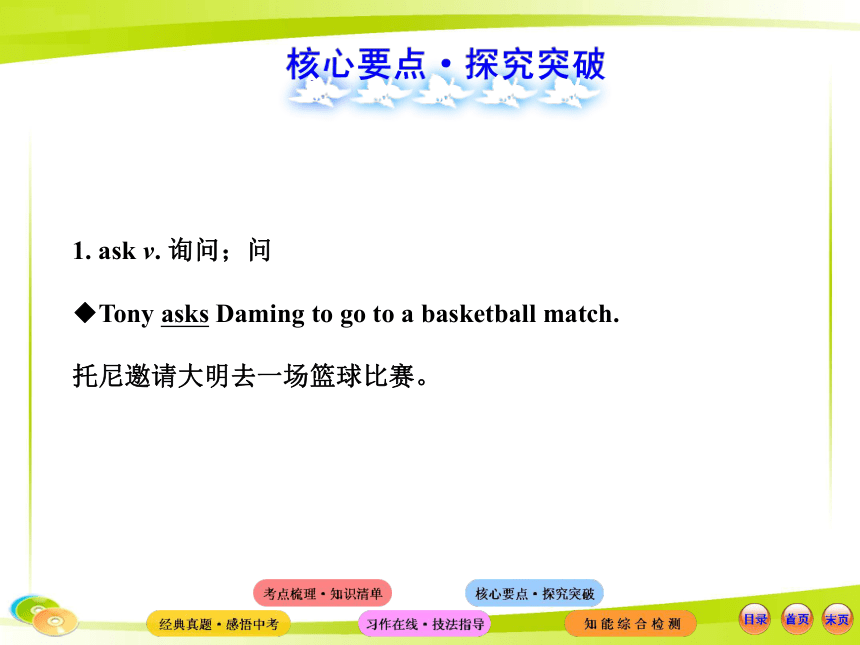
文档简介
(共56张PPT)
七年级上册 Modules 6~10
1. invite (v. ) → __________ (n. )邀请
2. swim (v. ) → __________ (n. ) 游泳
3. different (adj. ) → __________ (n. )不同
→ __________ (adv. )不同地
→ _____ (反义词) 相同的
invitation
swimming
difference
differently
same
4. usual (adj. ) → _______ (adv. ) 通常
→ ________ (反义词) 不同寻常的
5. sing (v. ) → ______ (n. ) 歌手
6. wolf (n. ) → ______ (pl. ) 狼
7. Australia (n. ) → __________ (adj. )澳大利亚的
usually
unusual
singer
wolves
Australian
8. Europe (n. ) → __________ (adj. ) 欧洲的
9. Asia (n. ) → ______ (adj. ) 亚洲的
10. America (n. ) → __________ (adj. )美国的
11. leaf (n. ) → ______ (pl. ) 叶子
12. print (v. ) → _______ (n. )打印机
13. final (adj. ) → ______ (adv. ) 最后
European
Asian
American
leaves
printer
finally
【品词自测】根据句意用所给词的适当形式填空
①There are many ________ (different)between Britain English and American English.
②Tom’s mother ________ (usual) goes to work by bus.
③She received an ________ (invite)to Tom’s birthday party, but she refused to go.
④The ground is covered with the golden ________ (leaf)in autumn. How beautiful the autumn is!
答案:①differences ②usually ③invitation ④leaves
1. 一张……的邀请函 an _________ __ . . .
2. 去看电影 ___ __ the ________
3. 待在家里 ____ __ home
4. 在星期天 ___ Sunday
5. 上语文课 _____ Chinese
6. 起床 ____ up
invitation to
go to
cinema
stay at
on
have
get
7. 吃早饭 / 午饭 / 晚饭 have _________ / ______/ _______
8. do one’s homework ____________________
9. go to bed _________
10. lots of ___________
11. on television _________
12. think of ______
breakfast
lunch
dinner
做(某人的)家庭作业
上床睡觉
大量;许多
在电视上
想出
1. 你想去电影院吗?
_______ you ____ __ ___ to the cinema
2. 让我们晚上去吧。
_____ ___ in the evening.
3. 你呢,贝蒂?
______ ______ you, Betty
Would
like to go
Let’s go
What about
4. ——熊猫来自中国吗?
——是的。
—______ the panda ______ from China
—Yes, it _____.
5. ——袋鼠是澳大利亚的吗?
——是的。
— ___ the kangaroo Australian
—Yes, it __.
Does
come
does
Is
is
6. 你通常在电脑上做什么?
______ ___ you _______ ___ on your computer
7. 你发多少封电子邮件?
_____ ______ emails ___ you _____
What do
usually do
How many
do
send
1. 情态动词would 【见P150】
2. 序数词 【见P137】
1. ask v. 询问;问
◆Tony asks Daming to go to a basketball match.
托尼邀请大明去一场篮球比赛。
①(2012·重庆中考)Mr. Li asks the students _______ in the river, because it’s too dangerous.
A. swim B. to swim
C. not to swim D. to not swim
②Don’t _______ the teacher _______ help at once when you meet a new word, you should think it over.
A. ask; to B. to ask; for
C. ask; for D. to ask; to
【自主归纳】ask构成的常用搭配的用法
(1)ask ____ (介词) help / sth. 请求帮助/要求某事物
(2)ask sb. ____ (介词) sth. 向某人寻求某事物
(3)ask sb. (not) ______ (to do/do) sth. 要求某人(不)做某事
(4)ask sb. about sth. 询问某人某事
答案:① C ② C
for
for
to do
2. talk v. 谈论;交流
◆—What are they talking about
—They are talking about the new film.
——他们正在谈论什么?
——他们正在谈论这部新电影。
①What language does your friend Lucy _______
A. talk B. tell C. say D. speak
②Our teacher is over there. Let’s _______ _______ _______ (向……问好)her.
③ Tell him to open the door, please. (改为否定句)
Tell him _______ _______ _______ the door, please.
【自主归纳】
答案:①D ②say hello to ③not to open
(1)
(2)
(3)
(4)
A. 强调说话的能力或说某种语言
B. 指连续不断地讲话,强调交谈
C. 告诉;讲述,强调讲给别人听
D. 强调说话的内容
3. house n. 房子,住宅
◆My school is next to my house.
我的学校和我家紧挨着。
用house/ home/ family填空
①The big white _______ is mine.
②Look at the photo of my _______. It is a big one.
③East or west, _______ is the best.
【自主归纳】
_____
家;家乡;本国
指家庭成员在一起生活的地方
_____
房子
主要指建筑物、住宅,可以包含若干房间(rooms)
______
家庭
指“一个家庭”时,视为一个整体,用作单数名词,谓语动词用 _____ (单数/复数)
家庭成员
指“家庭成员”时视为复数名词,谓语动词用 _____ (单数/复数)
home
house
family
单数
复数
答案:①house ②family ③home
home家 house房子 family家庭
4. always adv. 总是;一直
◆Tony always likes birthday parties.
托尼总是喜欢生日聚会。
①They often go to school on foot. (对画线部分提问)
______ ______ ______ they ______ to school on foot
②Tony is a good student, and he is _______ late for school.
A. always B. usually C. often D. never
【自主归纳】
(1)频度副词always/ usually/ often/ sometimes/ never的相同点
位置 ①be动词、助动词、情态动词之后,行为动词之前
②sometimes除了上述位置之外,还可置于句首或句尾
提问 对这些词提问要用_________
how often
(2)频度副词always/ usually/ often/ sometimes/ never的不同点
频度副词 含义 图示
_______ 总是;一直;始终
usually 通常
often 经常
always
频度副词 含义 图示
sometimes 有时;不时
_______ 从不
答案:①How often do; go ② D
never
5. sometimes adv. 有时
◆I sometimes play Counter Strike and Final Fantasy.
我有时玩“反恐精英”和“最终幻想”。
用sometimes/ some times/ sometime/ some time填空
① ______ she sends emails to me.
②I will go to visit the Great Wall ______ next week.
③We plan to stay in Hainan for ______.
④ —Have you been abroad
—Yes, I have been to America ______.
【自主归纳】
(1) __________ 的意思是“有时”,是副词。相当于at times。
(2) _________ 是副词,意思是“在某个时候”。表示过去或将来的不确定时间,可用于一般过去时与将来时。
(3)some times是一个名词短语,意思是“几次”。time在这里用作可数名词,意思是“次数”。
(4) __________ 也是名词短语,它的意思是“一段时间”。time在这里用作不可数名词,意思是“时间”。
sometimes
sometime
some time
【巧学助记】相聚在“某时”(some time); “有时”相聚加s(sometimes)要分开“一段时间”(some time); 加上s“若干次”(some times)。
答案:①Sometimes ②sometime ③some time
④some times
6. thousand num. 千
◆Sixteen thousand people visit it every day.
每天有1. 6万人参观它。
①(2012·滨州中考)在北京每天有数以千计的游客。
There are ______ ______ ______ in Beijing every day.
②Two _______ students in this school are from the USA.
A. thousands of B. thousand of
C. thousands D. thousand
【自主归纳】thousand的两种用法
(1)表示具体数目时, thousand 前加具体数字且不能用复数, 其后不加of。
(2)表示概数时, thousand后加-s 且后面要加of。
答案:①thousands of tourists ② D
7. lots of许多的,大量的
◆There are lots of books in our home.
在我们家有许多书。
①There are lots of students on the playground. (改为同义句)
There are ______ ______ ______ students on the playground. / There are ______ students on the playground.
②—Have you seen _______ English films
—Yes, I have.
A. many B. much C. a lot of D. lots of
【自主归纳】lots of / a lot of / many / much的用法
(1)lots of 相当于________, 一般用于肯定句中,既可以修饰可数名词又可以修饰不可数名词。
(2)修饰可数名词时,相当于______,修饰不可数名词时,相当于much。
(3)在否定句或疑问句中常用many或much。
答案:① a lot of;many ② A
a lot of
many
8. Would you like to go to the cinema
你愿意去电影院吗?
①—Would you like ______ (have) a picnic this Sunday
—Yes, I’d love to.
②Do you want a glass of water (改为同义句)
______ you ______ a glass of water
③—Would you like another cup of coffee
—_______.
A. I think B. I’d love to do
C. No, thanks D. I’m afraid
(1)Would you like some. . . 你想要一些……吗? 常用于征求对方意见,肯定回答:Yes,please. ;否定回答:No, thanks.
(2)Would you like to do. . . 你愿意去做……吗? 常用于向对方有礼貌地提出建议或发出邀请,like还可以用love代替。肯定回答: Yes, I’d love to. ;否定回答: I’d love to, but. . .
(3)would like ______ sth. 想做某事 相当于want to do sth. / feel like doing sth.
(4) would like sb. ______ sth. 想让某人做某事 相当于want sb. to do sth.
【自主归纳】有关would like的句型
to do
to do
【轻轻告诉你】
在Would you like some. . . 句型中要用some,而不用any,以表示说话人希望得到肯定回答。
答案:①to have ② Would; like ③ C
9. Let’s go in the evening. 让我们晚上去吧。
①Let’s ______ (take) a walk after supper.
②Let’s have a party next week, _______
A. shall we B. will you
C. don’t you D. are we
③Shall we go to the movies on Sunday evening (改为同义句)
______ ______ to the movies on Sunday evening.
Let’s do sth. 表示提建议,意为“咱们做某事吧”。一般肯定回答用OK. /All right. ;否定回答用Sorry, but I. . . ;反意疑问句用shall we
Let us do sth. 表示请求他人允许,意为“请让(允许)我们做某事吧”,反意疑问句一般用 _______ (shall we/will you)
【自主归纳】辨析let’s/let us
答案:①take ②A ③Let’s go
will you
【判断抢答】判断下面句子翻译正误
让我们一块回家,好吗?
①Let’s go home together, will you ( )
②Let’s go home together, shall we ( )
×
√
Ⅰ. 根据句意及中英文或首字母提示完成单词
1. (2012·黄冈中考)Their answers to the question were not the same, that’s to say, they answered the question _______ (不同地).
2. (2011·宿迁中考)As we know, _______ (星期一) is the second day of a week.
3. (2011·广安中考)Tom will hear from his parents this _______ (星期二).
答案:1. differently 2. Monday 3. Tuesday
4. (2011·漳州中考)It’s cool and the _______ (叶子) fall from the trees in autumn.
5. (2011·乐山中考)There are so many students playing basketball in the _______ (a place for students to play on).
6. (2011·日照中考)August is the e _______ month of the year.
7. (2011·百色中考)My brother wants to i _______ all his friends to his birthday party next week.
答案:4. leaves 5. playground 6. eighth 7. invite
Ⅱ. 根据句意及首字母提示或用所给词的适当形式填空
1. (2012·贵阳中考)Tina complains that waiting for Sally always _______ (make) her angry.
2. (2012·湖州中考)Thanks very much for i _______ me to your birthday party.
3. (2011·淮安中考)We’re doing a lot of activities to celebrate the _______ (ninety) birthday of the Communist Party of China(中国共产党) this year.
答案:1. makes 2. inviting 3. ninetieth
Ⅲ. 单项选择
1. (2012·济南中考)— Have you ever been to Disneyland
—No, _______. I hope I can go there next year.
A. always B. sometimes
C. never D. often
【解析】选C。考查频度副词。由答语句意“我希望明年去那儿。”可知没去过。always“总是”;sometimes“有时”;never“从来没有”;often“经常”。由句意可知,应选C。
2. (2012· 菏泽中考)—Steve, _______ do you play basketball after school
—Twice a week. It can keep me healthy.
A. how far B. how soon
C. how long D. how often
【解析】选D。考查疑问词辨析。how far“多远”,问路程;how soon“多久;多久之后”,对将来的一段时间之内或之后提问;how long“多长时间”,问时段;how often“多久一次”,问频率。由答语“Twice a week. ”可知问频率。故选D。
3. (2011· 湖州中考) A terrible earthquake happened in Japan _______ March, 2011.
A. to B. on C. in D. at
【解析】选C。考查介词的用法。年月日的前面用介词in或on, 其具体用法为:in 表示在某周、某年或某月;on表示在具体的某一日。“March, 2011” 意思为“2011年3月”,故选C。
4. (2011·兰州中考) He said he would come to see us _______ the next afternoon.
A. sometime B. some time
C. sometimes D. some times
【解析】选A。 考查sometime, some time, sometimes及some times的辨析。sometime “某时”,指过去或将来不确定的时间;some time “一段时间”;sometimes “有时,不时”;some times “几次”。由句意“他说他第二天下午的某个时间会来看我们。”可知应选A。
5. (2011·杭州中考)There are about two _______ students in the newly built school.
A. thousand B. thousands
C. thousand of D. thousands of
【解析】选A。考查数词thousand的用法。表示具体数字时,thousand前加具体数字且不能用复数,其后也不加of。句中有具体数字two,故选A。
6. (2011·兰州中考)“Don’t _______ to strangers on your way to and from school”, mother often _______ to me.
A. speak; says B. speak; tells
C. talk; speaks D. talk; tells
【解析】选A。考查词义辨析。句意:“在你上学或放学的途中,不要对陌生人讲话”,妈妈常常对我说。speak to sb. 对某人讲;say侧重于讲话的内容,故选A。
7. (2011·来宾中考)Everyone is here. Let’s _______ our class now.
A. begin B. began
C. beginning D. to begin
【解析】选A。考查句型。句意:每个人都在这儿。现在让我们开始上课吧。Let’s+动词原形“让我们……吧”。
电脑话题是历年许多地市中考考查频率最高的话题之一,其中以学生为背景设题最为常见。在写此类话题作文的过程中要特别注意几点:1. 观点要鲜明;2. 结构要合理。
【典题示例】
你家有电脑吗?你通常用电脑做些什么事情?你的同学用电脑做些什么事情?你认为电脑对于我们是利大于弊还是弊大于利?我们应该怎样正确使用电脑和网络呢?请陈述一下你的观点。(80词左右)
A computer
__________________________________________________________________________________________________________________________________________________________________
【审题谋篇】
1. 本篇文章应为议论文。主要考查学生对电脑的使用等方面英语语言运用方面的能力。
2. 人称:第一人称
3. 主要时态:一般现在时
4. 高分模板:
【佳作诵读】
A computer
I have a computer at home. I often use it to do my homework. I often go online. I often download some exercises from the Internet. I often chat on the computer with my best friends but I never play games. My friends also do homework on the computer. They usually play games or send emails to each other. I think playing games too much is bad for us. So we should do some right things on the Internet.
【名师点睛】
(1)文章以 “电脑”为话题,开门见山,阐述了电脑的作用,紧接着说出了电脑的害处,观点鲜明,并且文章最后提出了作者的建议。
(2)文章成功运用了use . . . to do sth. , go online, on the computer, send. . . to. . . , each other, be bad for. . . 等短语,体现了作者极强的语言运用能力。
七年级上册 Modules 6~10
1. invite (v. ) → __________ (n. )邀请
2. swim (v. ) → __________ (n. ) 游泳
3. different (adj. ) → __________ (n. )不同
→ __________ (adv. )不同地
→ _____ (反义词) 相同的
invitation
swimming
difference
differently
same
4. usual (adj. ) → _______ (adv. ) 通常
→ ________ (反义词) 不同寻常的
5. sing (v. ) → ______ (n. ) 歌手
6. wolf (n. ) → ______ (pl. ) 狼
7. Australia (n. ) → __________ (adj. )澳大利亚的
usually
unusual
singer
wolves
Australian
8. Europe (n. ) → __________ (adj. ) 欧洲的
9. Asia (n. ) → ______ (adj. ) 亚洲的
10. America (n. ) → __________ (adj. )美国的
11. leaf (n. ) → ______ (pl. ) 叶子
12. print (v. ) → _______ (n. )打印机
13. final (adj. ) → ______ (adv. ) 最后
European
Asian
American
leaves
printer
finally
【品词自测】根据句意用所给词的适当形式填空
①There are many ________ (different)between Britain English and American English.
②Tom’s mother ________ (usual) goes to work by bus.
③She received an ________ (invite)to Tom’s birthday party, but she refused to go.
④The ground is covered with the golden ________ (leaf)in autumn. How beautiful the autumn is!
答案:①differences ②usually ③invitation ④leaves
1. 一张……的邀请函 an _________ __ . . .
2. 去看电影 ___ __ the ________
3. 待在家里 ____ __ home
4. 在星期天 ___ Sunday
5. 上语文课 _____ Chinese
6. 起床 ____ up
invitation to
go to
cinema
stay at
on
have
get
7. 吃早饭 / 午饭 / 晚饭 have _________ / ______/ _______
8. do one’s homework ____________________
9. go to bed _________
10. lots of ___________
11. on television _________
12. think of ______
breakfast
lunch
dinner
做(某人的)家庭作业
上床睡觉
大量;许多
在电视上
想出
1. 你想去电影院吗?
_______ you ____ __ ___ to the cinema
2. 让我们晚上去吧。
_____ ___ in the evening.
3. 你呢,贝蒂?
______ ______ you, Betty
Would
like to go
Let’s go
What about
4. ——熊猫来自中国吗?
——是的。
—______ the panda ______ from China
—Yes, it _____.
5. ——袋鼠是澳大利亚的吗?
——是的。
— ___ the kangaroo Australian
—Yes, it __.
Does
come
does
Is
is
6. 你通常在电脑上做什么?
______ ___ you _______ ___ on your computer
7. 你发多少封电子邮件?
_____ ______ emails ___ you _____
What do
usually do
How many
do
send
1. 情态动词would 【见P150】
2. 序数词 【见P137】
1. ask v. 询问;问
◆Tony asks Daming to go to a basketball match.
托尼邀请大明去一场篮球比赛。
①(2012·重庆中考)Mr. Li asks the students _______ in the river, because it’s too dangerous.
A. swim B. to swim
C. not to swim D. to not swim
②Don’t _______ the teacher _______ help at once when you meet a new word, you should think it over.
A. ask; to B. to ask; for
C. ask; for D. to ask; to
【自主归纳】ask构成的常用搭配的用法
(1)ask ____ (介词) help / sth. 请求帮助/要求某事物
(2)ask sb. ____ (介词) sth. 向某人寻求某事物
(3)ask sb. (not) ______ (to do/do) sth. 要求某人(不)做某事
(4)ask sb. about sth. 询问某人某事
答案:① C ② C
for
for
to do
2. talk v. 谈论;交流
◆—What are they talking about
—They are talking about the new film.
——他们正在谈论什么?
——他们正在谈论这部新电影。
①What language does your friend Lucy _______
A. talk B. tell C. say D. speak
②Our teacher is over there. Let’s _______ _______ _______ (向……问好)her.
③ Tell him to open the door, please. (改为否定句)
Tell him _______ _______ _______ the door, please.
【自主归纳】
答案:①D ②say hello to ③not to open
(1)
(2)
(3)
(4)
A. 强调说话的能力或说某种语言
B. 指连续不断地讲话,强调交谈
C. 告诉;讲述,强调讲给别人听
D. 强调说话的内容
3. house n. 房子,住宅
◆My school is next to my house.
我的学校和我家紧挨着。
用house/ home/ family填空
①The big white _______ is mine.
②Look at the photo of my _______. It is a big one.
③East or west, _______ is the best.
【自主归纳】
_____
家;家乡;本国
指家庭成员在一起生活的地方
_____
房子
主要指建筑物、住宅,可以包含若干房间(rooms)
______
家庭
指“一个家庭”时,视为一个整体,用作单数名词,谓语动词用 _____ (单数/复数)
家庭成员
指“家庭成员”时视为复数名词,谓语动词用 _____ (单数/复数)
home
house
family
单数
复数
答案:①house ②family ③home
home家 house房子 family家庭
4. always adv. 总是;一直
◆Tony always likes birthday parties.
托尼总是喜欢生日聚会。
①They often go to school on foot. (对画线部分提问)
______ ______ ______ they ______ to school on foot
②Tony is a good student, and he is _______ late for school.
A. always B. usually C. often D. never
【自主归纳】
(1)频度副词always/ usually/ often/ sometimes/ never的相同点
位置 ①be动词、助动词、情态动词之后,行为动词之前
②sometimes除了上述位置之外,还可置于句首或句尾
提问 对这些词提问要用_________
how often
(2)频度副词always/ usually/ often/ sometimes/ never的不同点
频度副词 含义 图示
_______ 总是;一直;始终
usually 通常
often 经常
always
频度副词 含义 图示
sometimes 有时;不时
_______ 从不
答案:①How often do; go ② D
never
5. sometimes adv. 有时
◆I sometimes play Counter Strike and Final Fantasy.
我有时玩“反恐精英”和“最终幻想”。
用sometimes/ some times/ sometime/ some time填空
① ______ she sends emails to me.
②I will go to visit the Great Wall ______ next week.
③We plan to stay in Hainan for ______.
④ —Have you been abroad
—Yes, I have been to America ______.
【自主归纳】
(1) __________ 的意思是“有时”,是副词。相当于at times。
(2) _________ 是副词,意思是“在某个时候”。表示过去或将来的不确定时间,可用于一般过去时与将来时。
(3)some times是一个名词短语,意思是“几次”。time在这里用作可数名词,意思是“次数”。
(4) __________ 也是名词短语,它的意思是“一段时间”。time在这里用作不可数名词,意思是“时间”。
sometimes
sometime
some time
【巧学助记】相聚在“某时”(some time); “有时”相聚加s(sometimes)要分开“一段时间”(some time); 加上s“若干次”(some times)。
答案:①Sometimes ②sometime ③some time
④some times
6. thousand num. 千
◆Sixteen thousand people visit it every day.
每天有1. 6万人参观它。
①(2012·滨州中考)在北京每天有数以千计的游客。
There are ______ ______ ______ in Beijing every day.
②Two _______ students in this school are from the USA.
A. thousands of B. thousand of
C. thousands D. thousand
【自主归纳】thousand的两种用法
(1)表示具体数目时, thousand 前加具体数字且不能用复数, 其后不加of。
(2)表示概数时, thousand后加-s 且后面要加of。
答案:①thousands of tourists ② D
7. lots of许多的,大量的
◆There are lots of books in our home.
在我们家有许多书。
①There are lots of students on the playground. (改为同义句)
There are ______ ______ ______ students on the playground. / There are ______ students on the playground.
②—Have you seen _______ English films
—Yes, I have.
A. many B. much C. a lot of D. lots of
【自主归纳】lots of / a lot of / many / much的用法
(1)lots of 相当于________, 一般用于肯定句中,既可以修饰可数名词又可以修饰不可数名词。
(2)修饰可数名词时,相当于______,修饰不可数名词时,相当于much。
(3)在否定句或疑问句中常用many或much。
答案:① a lot of;many ② A
a lot of
many
8. Would you like to go to the cinema
你愿意去电影院吗?
①—Would you like ______ (have) a picnic this Sunday
—Yes, I’d love to.
②Do you want a glass of water (改为同义句)
______ you ______ a glass of water
③—Would you like another cup of coffee
—_______.
A. I think B. I’d love to do
C. No, thanks D. I’m afraid
(1)Would you like some. . . 你想要一些……吗? 常用于征求对方意见,肯定回答:Yes,please. ;否定回答:No, thanks.
(2)Would you like to do. . . 你愿意去做……吗? 常用于向对方有礼貌地提出建议或发出邀请,like还可以用love代替。肯定回答: Yes, I’d love to. ;否定回答: I’d love to, but. . .
(3)would like ______ sth. 想做某事 相当于want to do sth. / feel like doing sth.
(4) would like sb. ______ sth. 想让某人做某事 相当于want sb. to do sth.
【自主归纳】有关would like的句型
to do
to do
【轻轻告诉你】
在Would you like some. . . 句型中要用some,而不用any,以表示说话人希望得到肯定回答。
答案:①to have ② Would; like ③ C
9. Let’s go in the evening. 让我们晚上去吧。
①Let’s ______ (take) a walk after supper.
②Let’s have a party next week, _______
A. shall we B. will you
C. don’t you D. are we
③Shall we go to the movies on Sunday evening (改为同义句)
______ ______ to the movies on Sunday evening.
Let’s do sth. 表示提建议,意为“咱们做某事吧”。一般肯定回答用OK. /All right. ;否定回答用Sorry, but I. . . ;反意疑问句用shall we
Let us do sth. 表示请求他人允许,意为“请让(允许)我们做某事吧”,反意疑问句一般用 _______ (shall we/will you)
【自主归纳】辨析let’s/let us
答案:①take ②A ③Let’s go
will you
【判断抢答】判断下面句子翻译正误
让我们一块回家,好吗?
①Let’s go home together, will you ( )
②Let’s go home together, shall we ( )
×
√
Ⅰ. 根据句意及中英文或首字母提示完成单词
1. (2012·黄冈中考)Their answers to the question were not the same, that’s to say, they answered the question _______ (不同地).
2. (2011·宿迁中考)As we know, _______ (星期一) is the second day of a week.
3. (2011·广安中考)Tom will hear from his parents this _______ (星期二).
答案:1. differently 2. Monday 3. Tuesday
4. (2011·漳州中考)It’s cool and the _______ (叶子) fall from the trees in autumn.
5. (2011·乐山中考)There are so many students playing basketball in the _______ (a place for students to play on).
6. (2011·日照中考)August is the e _______ month of the year.
7. (2011·百色中考)My brother wants to i _______ all his friends to his birthday party next week.
答案:4. leaves 5. playground 6. eighth 7. invite
Ⅱ. 根据句意及首字母提示或用所给词的适当形式填空
1. (2012·贵阳中考)Tina complains that waiting for Sally always _______ (make) her angry.
2. (2012·湖州中考)Thanks very much for i _______ me to your birthday party.
3. (2011·淮安中考)We’re doing a lot of activities to celebrate the _______ (ninety) birthday of the Communist Party of China(中国共产党) this year.
答案:1. makes 2. inviting 3. ninetieth
Ⅲ. 单项选择
1. (2012·济南中考)— Have you ever been to Disneyland
—No, _______. I hope I can go there next year.
A. always B. sometimes
C. never D. often
【解析】选C。考查频度副词。由答语句意“我希望明年去那儿。”可知没去过。always“总是”;sometimes“有时”;never“从来没有”;often“经常”。由句意可知,应选C。
2. (2012· 菏泽中考)—Steve, _______ do you play basketball after school
—Twice a week. It can keep me healthy.
A. how far B. how soon
C. how long D. how often
【解析】选D。考查疑问词辨析。how far“多远”,问路程;how soon“多久;多久之后”,对将来的一段时间之内或之后提问;how long“多长时间”,问时段;how often“多久一次”,问频率。由答语“Twice a week. ”可知问频率。故选D。
3. (2011· 湖州中考) A terrible earthquake happened in Japan _______ March, 2011.
A. to B. on C. in D. at
【解析】选C。考查介词的用法。年月日的前面用介词in或on, 其具体用法为:in 表示在某周、某年或某月;on表示在具体的某一日。“March, 2011” 意思为“2011年3月”,故选C。
4. (2011·兰州中考) He said he would come to see us _______ the next afternoon.
A. sometime B. some time
C. sometimes D. some times
【解析】选A。 考查sometime, some time, sometimes及some times的辨析。sometime “某时”,指过去或将来不确定的时间;some time “一段时间”;sometimes “有时,不时”;some times “几次”。由句意“他说他第二天下午的某个时间会来看我们。”可知应选A。
5. (2011·杭州中考)There are about two _______ students in the newly built school.
A. thousand B. thousands
C. thousand of D. thousands of
【解析】选A。考查数词thousand的用法。表示具体数字时,thousand前加具体数字且不能用复数,其后也不加of。句中有具体数字two,故选A。
6. (2011·兰州中考)“Don’t _______ to strangers on your way to and from school”, mother often _______ to me.
A. speak; says B. speak; tells
C. talk; speaks D. talk; tells
【解析】选A。考查词义辨析。句意:“在你上学或放学的途中,不要对陌生人讲话”,妈妈常常对我说。speak to sb. 对某人讲;say侧重于讲话的内容,故选A。
7. (2011·来宾中考)Everyone is here. Let’s _______ our class now.
A. begin B. began
C. beginning D. to begin
【解析】选A。考查句型。句意:每个人都在这儿。现在让我们开始上课吧。Let’s+动词原形“让我们……吧”。
电脑话题是历年许多地市中考考查频率最高的话题之一,其中以学生为背景设题最为常见。在写此类话题作文的过程中要特别注意几点:1. 观点要鲜明;2. 结构要合理。
【典题示例】
你家有电脑吗?你通常用电脑做些什么事情?你的同学用电脑做些什么事情?你认为电脑对于我们是利大于弊还是弊大于利?我们应该怎样正确使用电脑和网络呢?请陈述一下你的观点。(80词左右)
A computer
__________________________________________________________________________________________________________________________________________________________________
【审题谋篇】
1. 本篇文章应为议论文。主要考查学生对电脑的使用等方面英语语言运用方面的能力。
2. 人称:第一人称
3. 主要时态:一般现在时
4. 高分模板:
【佳作诵读】
A computer
I have a computer at home. I often use it to do my homework. I often go online. I often download some exercises from the Internet. I often chat on the computer with my best friends but I never play games. My friends also do homework on the computer. They usually play games or send emails to each other. I think playing games too much is bad for us. So we should do some right things on the Internet.
【名师点睛】
(1)文章以 “电脑”为话题,开门见山,阐述了电脑的作用,紧接着说出了电脑的害处,观点鲜明,并且文章最后提出了作者的建议。
(2)文章成功运用了use . . . to do sth. , go online, on the computer, send. . . to. . . , each other, be bad for. . . 等短语,体现了作者极强的语言运用能力。
